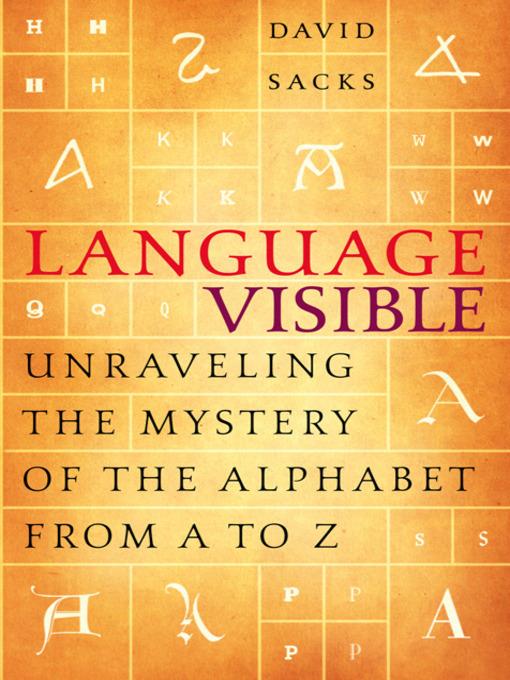
Language Visible
Unraveling the Mystery of the Alphabet from A to Z
کتاب های مرتبط
- اطلاعات
- نقد و بررسی
- دیدگاه کاربران
نقد و بررسی

July 28, 2003
Following up on his Encyclopedia of the Ancient Greek World, Sacks here delves into the origins of the Roman alphabet. Its beginnings appear to lie with Semitic-speaking mercenaries in Egypt, who borrowed from their overlords' hieroglyphics to create a system of sound-representing signs, many of which survive today in the Hebrew alphabet. Along the way, the Indo-European Greek language borrowed the Semitic alphabet of the Phoenicians, which when transmuted by the Romans gave us 24 of our 26 modern English letters. The bulk of the book offers beautifully illustrated capsule biographies of all 26, including J and V, which did not enter regular usage until the 17th century and were not standardized until the 19th. Beyond initial "A", the Sacks covers the first letters of several of the words for God; M, which begins an extraordinary number of the words for "Mother"; and "O," which requires the most shaping by the lips. There are essays on lexicographers (Samuel Johnson and Noah Webster, among others), on printing, and on how the letter X came to stand for the unknown in mathematics because Descartes's printer was running out of Ys and Zs to print all of the mathematician's equations. Such anecdotes, and the care evinced throughout, make this a demanding gem of popular linguistic history, and any book that includes a chapter called "The Birth of 'V'ness" certainly avoids taking itself too seriously.

July 1, 2003
Joining the sizable field of popular cultural histories of the Roman alphabet published in the last ten years (e.g., Johanna Drucker's The Alphabetic Labyrinth and John Man's Alpha Beta), this contribution by Sacks (The Encyclopedia of the Ancient Greek World) is distinguished by its remarkably long and broad view of the topic and its omnivorous sense of fun. Sacks starts with a clear and appealing discussion of the genealogy of the letters we use every day, from the earliest known alphabet inscriptions found recently in Egypt through the Phoenicians, the Greeks, and Romans up to the present. He then devotes a chapter to each letter, discussing its development from ancient forms, attempting to identify and document its unique significance, and collecting a dazzlingly diverse array of facts that include its role in literature, media, and culture. From discussions of the letter A's role in meat grading, bond rating, student ranking, and punishment for adultery to Z's exotic associations with Zorro, Sacks makes the history of the alphabet a joy to read. Recommended for most libraries.-Paul D'Alessandro, Portland P.L., ME
Copyright 2003 Library Journal, LLC Used with permission.

July 1, 2003
From " aleph "(ancient forerunner of our own " a"), discovered carved in Egyptian stone as part of the oldest known alphabetic inscription, all the way to the repeated " Z"s that help give the rock group ZZ Top its name, journalist Sacks unfolds the romance and magic of the English alphabet. Although Sacks writes for nonspecialists, he distills an impressive range of scholarship into his examination of the alphabet's complex cultural history. Readers learn about the astonishing recent archaeological discoveries in central Egypt that have overturned previous theories locating the alphabet's origins in ancient Canaan. We likewise learn about the surprising linguistic flexibility that allowed a single alphabet to jump language barriers around the world, thus giving most of the globe's literate populations recognizably related scripts. This is a delightfully entertaining and engrossing tale of how the score of Roman letters that arrived in England in the seventh century eventually gave us everything from the poetry of William Shakespeare to the official grades used by meat inspectors to evaluate chicken.(Reprinted with permission of Booklist, copyright 2003, American Library Association.)

























دیدگاه کاربران